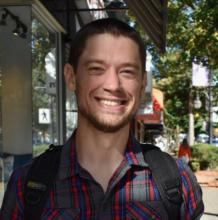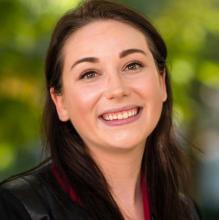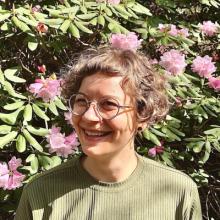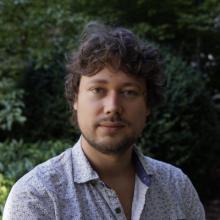José is a Forest Engineer from the University of Chile. He has collaborated with Indigenous communities in Chile and Canada regarding climate change and Indigenous knowledge. Currently, he is a Ph.D. candidate in the UBC Faculty of Forestry, and a Liu Scholar at the Liu Institute for Global Issues.
Research Description
Mapuche people are claiming rights to their ancestral territorial spaces, including the ownership of land and control over the territory. Forest companies have legal access to the same lands, and therefore are able to develop the land by the means they consider best for their own interest. The State has been an accomplice to the unfair practices by forest companies, providing subsidies for the establishment of tree plantations, and militarizing the communities near the plantations. Mapuche communities, are experiencing the impacts of climate change. For instance, drought and forest fires combined with the impacts of logging operations and introduced forest plantations have created a very complex scenario for the communities. In this context, my research tries to understand how Mapuche people, with a livelihood affected by the constant conflict with forest companies, adapt to the impacts of a changing climate in a way to secure their survival and their culture.
What does being a Public Scholar mean to you?
To me being a public scholar means to act beyond the personal interest and being able to think out of the box when it is needed, in order to provide solutions to different groups of people. Also, in my case, although I am a forester by training (BSc, MSc), I am always striving to be more interdisciplinary in my approaches, particularly integrating approaches from indigenous methodologies and social sciences. Currently, I am a Ph.D. candidate in the UBC Faculty of Forestry, and a Liu Scholar at the Liu Institute for Global Issues, an interdisciplinary research hub for emerging global issues in the Faculty of Arts at UBC. The focus of my research is placed on Indigenous communities from Chile, with a particular interest in the struggles of Mapuche communities. For this reason, while doing fieldwork, I do not only collect data but I also engage in different activities, from traditional ceremonies to marches on the streets. And, whenever possible, I put my expertise to the service of the communities I am working with (e.g. writing professional reports, providing advice, etc.).
In what ways do you think the PhD experience can be re-imagined with the Public Scholars Initiative?
Allowing us to pursue ideas out of the normal the PSI is already transforming the Ph.D. experience not only by providing the funding to do so, but also providing different opportunities to acquire the necessary skills to accomplish our dreams for the greater good. Moreover, the PSI Network provides a unique opportunity to gain insights from other members' experiences and backgrounds, in order to improve my own research and future work. Thus, feedback from peers and senior researcher from across fields will be a great value for my research. I can foresee many opportunities to discuss with colleagues from different fields the implications of their work and of my own, and how we can integrate different views on our research.
How do you envision connecting your PhD work with broader career possibilities?
There are plans to continue the work I am doing for my Ph.D., in collaboration with the ATM, and with some alliances that I was able to establish during the field work (e.g. Indigenous Studies Institute at University of La Frontera, and the Department of Geography at the University of Valparaiso). One of these alliances is a professor from the University of Valparaiso, who also collaborates with the ATM. Our plan is to create a Mapuche NGO, in order to be a more structured organization, and thus be able to apply for funding to keep supporting the needs of Mapuche communities, and the conservation of natural resources they depend on. In addition, after I graduate from the Ph.D. program, I would like to apply for a postdoctoral position in a different department, in order to broaden my perspectives, as of now, one of my first options is the UBC Department of Geography.
How does your research engage with the larger community and social partners?
My research is at the edge of activism, and therefore engagement of, and collaboration with communities is paramount in order understand the demands of the Mapuche. At the same time how they have been surviving in their traditional territories despite the constant effort of the Chilean State to integrate them into the mainstream society. For their survival, it has been key the preservation of their traditional knowledge and building up on that knowledge, my research is intended to discover new strategies to deal with the impacts of a changing environment. Thus, through collaborative action research, I have been able to work with Indigenous communities. Also, I participated in several informal and private meetings, as well as traditional ceremonies. As well, I was able to work with experts and professionals from different institutions, including government (CONAF, INDAP, CONADI, INIA), Universities (UFRO, UCT, UACH, UCH), and NGOs (AIFBN, Bosques Modelo Alto Malleco - BMAAM). Moreover, during my fieldwork, I was able to directly work with Mapuche grassroots organizations, and I learned from them the daily struggles Mapuche people have to go through. One of these organizations was the Mapuche Territorial Alliance (ATM). The ATM’s core mission is the full defense of Mapuche inherent rights, especially concerning the protection of the territory and the natural environment. The collaboration with the ATM was of great help when identifying Mapuche communities experiencing different levels of conflict over access to land, and at the same time suffering from the impacts of climate change (e.g. water scarcity), and key actors in the field. Their network was of great value in establishing the first contact with the communities’ members to create rapport and build trust. This was particularly true in areas where outsiders are literally not welcome.
Why did you decide to pursue a graduate degree?
To be honest, curiosity and better opportunities were the main reasons to decide to pursue a graduate degree. It was a family decision, as my wife also wanted to pursue the same path. We were curious about living in a different country, with a different language, but that was the challenge. As well, looking for better opportunities for our future, not only in academic terms but also in terms of life quality for our family.
Why did you choose to come to British Columbia and study at UBC?
I do believe that providing new knowledge and insights through collaborative research could be valuable evidence to support structural changes in Chile and Canada. To achieve this goal, I decided to continue deepening my knowledge of Human Adaptation to Environmental Change in Forest Ecosystems and decolonizing methodologies in a top world forestry country like Canada, and particularly in the Province of British Columbia where there is a strong presence of First Nations.
I hope that my research can contribute to a better understanding of the demands of the Mapuche people by the larger society, on the one hand, and to advance the climate change adaptation agenda from an Indigenous perspective, on the other hand.




